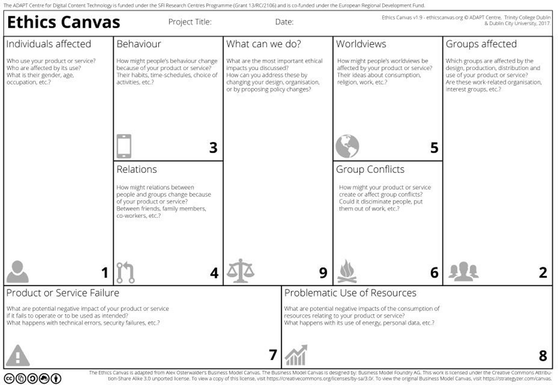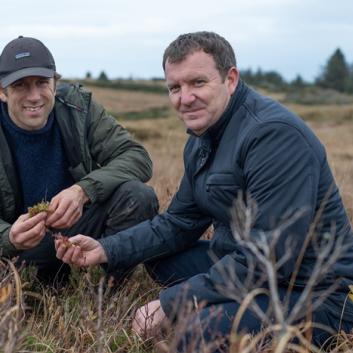Creating better innovations with the Ethics Canvas framework
Just because it’s innovative is it actually good? The landscape of technological innovation is rapidly changing and most of the time ethical considerations are not even on the checklist. Currently, ethics in research and innovation is a very top-down process that relies on compliance.
The Ethics Canvas framework was created by academics at ADAPT Research Centre Dublin, to reflect on the potential impact of innovation on society.
“Ethics is not simply about compliance but requires active reflection during the design process.
Technological innovations are changing the world faster than ever. At the same time, people are increasingly concerned about the ethical impacts of technologies.
This has led to a damaged image of the tech-sector and rising concerns for policymakers.” says Dave Lewis, Associate Professor, School of Computer Science and Statistics at Trinity College Dublin.
Building the Ethics Canvas in collaboration
Your contribution is needed to create a free tool which can help to build a better society and better quality of life for all of us.
The Ethics Canvas provides a tool that can be part of the solution to the problems that ethics in research and innovation faces. It allows researchers and innovators to reflect on the ethical impacts of their work.
This is a free open source material which was designed as an intuitive tool that helps innovators to:
- Brainstorm about the ethical implications of a project and represent them in a canvas.
- Analyse the ethical concerns of a project considering all stakeholders and find suitable solutions that reflect on shared values.
- Learn from similar use cases and share your experiences
The Ethics Canvas is an easy to use collaborative tool that assists in the identification of ethical impacts of research and innovation projects and incentivises actions towards tackling these impacts.
The Ethics Canvas distinguishes 6 main types of ethical impacts that innovation can have:
- individual behaviour (changing habits, patterns)
- relations (friends, family, professional life)
- worldviews (political, religious, scientific)
- social conflicts (inequality, lack of justice)
- resource use (climate change, toxics)
- product or service failure (fallout, safety)
It offers guidance for thinking about ethical impacts of technology in a holistic way. For this purpose, it has revisited the ‘building blocks’ of the Business Model Canvas by answering three basic questions:
Who might be affected by the technology? What are the potential ethical impacts on these people and groups? How can we address these ethical impacts?
Who can use this framework best?
Researchers: For discussing ethical impact of their research and innovation projects.
Entrepreneurs: For creating innovative products, services in an ethical and responsible way.
Policymakers: For better understanding ethical impacts and finding policies to solve them.
Teachers: For teaching engineering and business students about ethics.
How to use it?
1 – Identifying relevant stakeholders:
Who might be affected by the technology in question? Think not just about your users but anyone who can be affected – individuals, groups.
2 – Explore ethical impacts:
How might people’s behaviour or relations change because of your product or service? Considering individual and social perspectives in relation to worldviews, value conflicts.
What are the potential negative impacts of required resources relating to your project? What happens with technical errors, security failures, end of life products, etc.?
3 – Discussing remedial actions:
What are the most important ethical impacts you found? How can you address these by changing your design, organisation, or by proposing broader changes?
As a result, you will have gained a better understanding of the potential ethical impacts of your innovation and some first ways to address these.
How can you contribute?
Take these very easy steps to become part of the solution:
- Start using the online Ethics Canvas or download the pdf format: www.ethicscanvas.org
- Send your feedback with ideas, suggestions on how to make it better! Contact us here!
- Share this open call for the contribution!


















